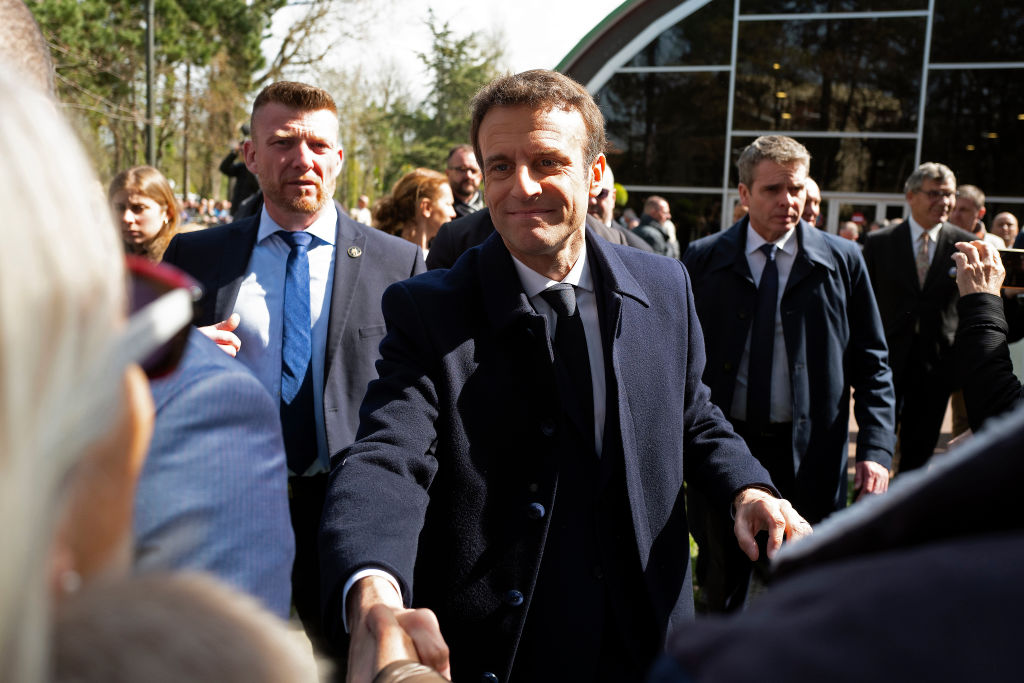Macron and Le Pen will advance to runoff in French presidential election, preliminary results suggest


A free daily email with the biggest news stories of the day – and the best features from TheWeek.com
You are now subscribed
Your newsletter sign-up was successful
French President Emmanuel Macron is projected to win the first round of the presidential election, but will fall far short of the 50 percent of the vote he would need to avoid a runoff, France Info reported Sunday.
According to projections compiled by consulting firms Ipsos and Sopra Steria, Macron received 28.1 percent of the vote with right-wing challenger Marine Le Pen in second place with 23.3 percent. The two will face each other in a runoff election on April 24.
Leftist Jean-Luc Mélenchon finished third with 20.1 percent, while journalist Éric Zemmour, who ran to Le Pen's right, took fourth with 7.2 percent.
The Week
Escape your echo chamber. Get the facts behind the news, plus analysis from multiple perspectives.

Sign up for The Week's Free Newsletters
From our morning news briefing to a weekly Good News Newsletter, get the best of The Week delivered directly to your inbox.
From our morning news briefing to a weekly Good News Newsletter, get the best of The Week delivered directly to your inbox.
Almost three quarters of eligible voters cast ballots, down slightly from 2017.
Macron and Mélenchon slightly outperformed a poll conducted on Thursday and Friday, which showed their support at 26 and 17.5 percent, respectively. Le Pen underperformed slightly, having polled at 25 percent.
Early last month, Macron held a 61-31 lead over Le Pen, who he soundly defeated in 2017's runoff, but voters' concerns about rising costs of living wiped it out almost entirely in the weeks preceding the election. The two are polling dead even for the second round.
Center-right candidate Valérie Pécresse, who received just 5 percent of the vote, conceded defeat Sunday and said she would vote for Macron "to prevent the coming to power of Marine Le Pen."
A free daily email with the biggest news stories of the day – and the best features from TheWeek.com
According to an Ipsos poll conducted on Friday, 38 percent of Pécresse's supporters identified Macron as their second choice, while only 19 percent named Le Pen.
Grayson Quay was the weekend editor at TheWeek.com. His writing has also been published in National Review, the Pittsburgh Post-Gazette, Modern Age, The American Conservative, The Spectator World, and other outlets. Grayson earned his M.A. from Georgetown University in 2019.
-
 ‘Restaurateurs have become millionaires’
‘Restaurateurs have become millionaires’Instant Opinion Opinion, comment and editorials of the day
-
 Earth is rapidly approaching a ‘hothouse’ trajectory of warming
Earth is rapidly approaching a ‘hothouse’ trajectory of warmingThe explainer It may become impossible to fix
-
 Health insurance: Premiums soar as ACA subsidies end
Health insurance: Premiums soar as ACA subsidies endFeature 1.4 million people have dropped coverage
-
 NIH director Bhattacharya tapped as acting CDC head
NIH director Bhattacharya tapped as acting CDC headSpeed Read Jay Bhattacharya, a critic of the CDC’s Covid-19 response, will now lead the Centers for Disease Control and Prevention
-
 ‘Poor time management isn’t just an inconvenience’
‘Poor time management isn’t just an inconvenience’Instant Opinion Opinion, comment and editorials of the day
-
 Witkoff and Kushner tackle Ukraine, Iran in Geneva
Witkoff and Kushner tackle Ukraine, Iran in GenevaSpeed Read Steve Witkoff and Jared Kushner held negotiations aimed at securing a nuclear deal with Iran and an end to Russia’s war in Ukraine
-
 Pentagon spokesperson forced out as DHS’s resigns
Pentagon spokesperson forced out as DHS’s resignsSpeed Read Senior military adviser Col. David Butler was fired by Pete Hegseth and Homeland Security spokesperson Tricia McLaughlin is resigning
-
 Judge orders Washington slavery exhibit restored
Judge orders Washington slavery exhibit restoredSpeed Read The Trump administration took down displays about slavery at the President’s House Site in Philadelphia
-
 Kurt Olsen: Trump’s ‘Stop the Steal’ lawyer playing a major White House role
Kurt Olsen: Trump’s ‘Stop the Steal’ lawyer playing a major White House roleIn the Spotlight Olsen reportedly has access to significant US intelligence
-
 Hyatt chair joins growing list of Epstein files losers
Hyatt chair joins growing list of Epstein files losersSpeed Read Thomas Pritzker stepped down as executive chair of the Hyatt Hotels Corporation over his ties with Jeffrey Epstein and Ghislaine Maxwell
-
 Judge blocks Hegseth from punishing Kelly over video
Judge blocks Hegseth from punishing Kelly over videoSpeed Read Defense Secretary Pete Hegseth pushed for the senator to be demoted over a video in which he reminds military officials they should refuse illegal orders
